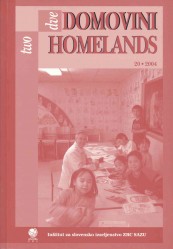FROM THE DEMAND FOR RENOUNCING MOTHER TONGUE TO APPRECIATION OF BILINGUALISM: EDUCATIONAL SYSTEM IN AUSTRALIA
Abstract
The entire Australian society is essentially marked by three periods in regard of dealing with immigrants; they go from the policy of white Australia to non-discriminatory immigration policy, called Australian multiculturalism. All mentioned periods substantially influence the Australian education system as well. Australia has long ago accepted the standpoint that mastering English language is the key to a complex participation in Australian society. What is new in multiculturalism policy in comparison to the previous two periods is that it does not demand oblivion of the cultures of immigrants. A variety of aspects of Australian way of life exists, which the newcomers must accept but at the same time it is anticipated that immigrants and their children might want to preserve their customs and tradition. That reflects in education as well. Multicultural education is not a part of the curriculum in the form of a specific subject, for example mathematics. Subjects, which at first sight reflect multiculturalism most are English language as a second language (ESL) and languages other than English (LOTE). Multicultural education as such must be a composite part of all major education fields and must be reflected in the ethos of schools.
As researches indicate, school plays a significant role in learning English with children of parents who know little or no English language; with this connected is the anticipation that the children of immigrants will as adults include successfully in the labour market and in Australian society as a whole. Numerous programmes are formed for immigrant children, from enabling additional aid to pupils originating from non English speaking environments to English as a second language, which pupils attend instead of the “real” English, and English language schools and centres for newcomers. It is on the other hand possible to learn several other languages which pupils can take as graduation exams, with which the equality of languages and cultures is practised on the school level.
The Australian educational system most certainly exhibits a huge effort and tendency for equality of all ethnic communities, and leaves to the individual to decide which customs deriving from one’s heritage one will preserve and which one will change, which all indicates a wide openness of the Australian society. If the statement that a civilisation should be judged by its attitude towards minorities holds, there is certainly much effort invested in that direction. That does not mean there is no discrimination in Australian schools and society; this is one of the themes, which they cannot and do not want ever to avoid because of their multiculturalism, and which they at all times try to keep in the centre of attention and confront with it.
Downloads
References
Australian multiculturalism fo r a new century: Towards inclusiveness (1999). Australia: National M ulticultural Advisory Council, str. 122.
Ceferin, Aleksandra (2003). Slovenian Language in Australia: 25years o f Slovenian language in Victorian Schools. Victoria: Institute for Slovenian Studies in Victoria.
Ceferin, Aleksandra (2004). Šolskovzgojni sistem v Avstraliji: Viktorija 1980-2003, koledar Slovenske izseljenske matice.
C ollins, Jock (1988). M igrant Hands in a D istant Land. Sydney, London: Pluto Press.
Čebulj Sajko, Breda (1992). M edsrečo in svobodo. Ljubljana: samozaložba, str. 251.
Čebulj Sajko, Breda (2000). Razpotja izseljencev. Ljubljana: Založba ZRC, str. 140.
ESL Report 2002 (2003). Victoria: O ffice o f School Education, str. 48.
Jordens, Ann-Mari (1997). Alien to citizen: Settling migrants in Australia. 1945-1975, Australia: Allen and Unwin with Australian Archives.
Khoo, Siew-Ean idr. (2002). Second Generation Australians. Australia: Department o f Immigration and M ulticultural and Indigenons Affairs, str. 148.
Languages other than English in governem ent schools 2002 (2002). M elbourne: Com m unications Division, for the Office o f School Education, Department o f Education and Training, str. 106.
Lukšič - Hacin, M arina (2004). Konceptualne dileme v razpravah o multikulturalizmu in globalizaciji, Dve domovini/Two homelands, 19, str. 107-120.
Mikola, Maša (2004). Etnična izbira, odavstralskih Slovencev do slovenskih Avstralcev, diplom sko delo. Ljubljana: Fakulteta za družbene vede, str. 84.
Milharčič - Hladnik, M irjam (2004). Ohranjanje etnične identitete in tradicije med slovenskimi izseljenci in njihovimi potomci v Združenih državah Amerike, Dve domovini/Two homelands, 19, str. 121-140.
Multicultural policy fo r Victorian schools (1997). Victoria: Department of Education.
Second generation Australians (2002), str. 15.
Skrbiš, Zlatko (1994). O nethnic »communities« innon-native environm ents, D ve domovini/Two homelands. 5, str. 137-149.
Skrbiš, Zlatko (1996). »Slovenes in Australia: some decades later towards a research agenda«, Soočanje mita in realnosti ob prihodu izseljencev v novo okolje (ur. Irena G antar Godina), Ljubljana: Inštitut za izseljenstvo, ZRC SAZU, str. 63-68.
Skrbiš, Zlatko (2001). »Slovenes«, The Australian People (ur. J. Jupp), Cambridge: University Press, str. 686-687.
Skrbiš, Zlatko (2003). Diasporično slovenstvo: politika, nacionalizem in mobilnost, Družboslovne razprave, 42, str. 9-20.
Zalokar, Jurij (1991). Mavrična kača. Radovljica: Didakta.
Žele, Silvia (2003). »W hat is like to be a person o f Slovenian heritage in Australia?«- (prispevek na konferenci Slovenian language and culture - the Future, Kew, Melburne, 23. 3. 2003), str. 3.
^ ^ w . sofweb.vic.edu.au
www.immi.gov.au
^ ^ w . decs.act.gov.au
Downloads
Published
How to Cite
Issue
Section
License

This work is licensed under a Creative Commons Attribution-NonCommercial-NoDerivatives 4.0 International License.
Authors guarantee that the work is their own original creation and does not infringe any statutory or common-law copyright or any proprietary right of any third party. In case of claims by third parties, authors commit their self to defend the interests of the publisher, and shall cover any potential costs.
More in: Submission chapter





